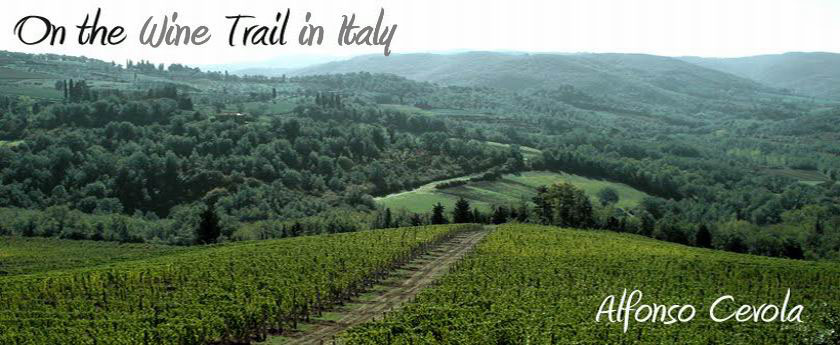 A fascinating aspect about Italy is what it represents to people, what they think it is. Aside from the usual misunderestimations about Italian food (spaghetti and meat balls) or wine ( Santa Margherita Pinot Grigio), it goes to a deeper level. Italy is the four cities: Rome, Florence, Venice and Milan. Doesn't anybody ever talk about going to Torino or Palermo? Italy has such wonderful countryside in Tuscany. The Amalfi Coast is so picturesque. As if getting to the Tuscan countryside or the Amalfi Coast weren't strewn with unbelievable beauty along the way?
A fascinating aspect about Italy is what it represents to people, what they think it is. Aside from the usual misunderestimations about Italian food (spaghetti and meat balls) or wine ( Santa Margherita Pinot Grigio), it goes to a deeper level. Italy is the four cities: Rome, Florence, Venice and Milan. Doesn't anybody ever talk about going to Torino or Palermo? Italy has such wonderful countryside in Tuscany. The Amalfi Coast is so picturesque. As if getting to the Tuscan countryside or the Amalfi Coast weren't strewn with unbelievable beauty along the way?So it was with me, when I arrived in Merano at the base of the Dolomites, 70 miles from the Austrian border. In a store back home, I ran into a local person, and they asked me about where I had just been. When I told them the Merano Wine Festival, they remarked, “Oh, don’t you just love the colorful glass from there?” Why, yes I do. Especially when they get it from Murano.
I don’t get as worked up over those encounters anymore. I find them bewilderingly amusing. I tell myself, at least they are appreciating something Italian. Oh, and pass the meatballs, please.
Merano must be wonderful in the summertime. I’ll not likely get there in that period. I prefer large bodies of water, the Pacific or the Adriatic or some lake, somewhere. But I can imagine its attraction, with those long days and moderate temperatures, especially when I am in Texas in July. Which is more likely the case than not. What an oasis it must be.
 We arrived at Merano in time for a little snow flurry action in the higher elevations. Nothing to wreck the leather-soled shoes, rather a light dusting that one could admire from a distance.
We arrived at Merano in time for a little snow flurry action in the higher elevations. Nothing to wreck the leather-soled shoes, rather a light dusting that one could admire from a distance.Here the wines have names like Kerner, Schiava, Lagrein, and Zweigelt. The last three are red wines. These are wines that are more well known coming from other countries, say Germany or Austria. But because they are technically grown and made in Italy, they can be marketed in the US in Italian restaurants and wine bars. Still a bit of a tough sell, because the names are as difficult to pronounce as Falanghina or Granaccia, which are also not household names.

Gestalt at Ristorante Laubenkeller: wine & wall
Again, this is the beauty of things Italian: not to be pigeonholed into the same old fiasco. The awe of this Italian wine labyrinth is in the complexity, the diversity, the seemingly endless variation. Want something simple? Go to France, or Germany. Those countries are infinitely easier to grasp.
This side of Italy can be a comforting change from the chaos of Southern Italy, or even the maddening laissez-faire of places like the Marche. Here in Merano there is order. One friend remarked that it was the worst of both worlds, the irrationality of the Italian with the inflexibility of the Teutonic. I see it another way: The creativity of the Italian is tethered and brought into a workable state by the rational determination of an ordered society. Brightly painted walls, but with a paint to last through winter snow storms.
 Still, there are madmen wandering out of the asylum. Who else will pay €149.00 (that’s US $225.00) for a pair of jeans that looked like they were fished from the bottom of the pile in a thrift store? Oh yeah, someone drinks a little too much Die Jäeger in these parts too.
Still, there are madmen wandering out of the asylum. Who else will pay €149.00 (that’s US $225.00) for a pair of jeans that looked like they were fished from the bottom of the pile in a thrift store? Oh yeah, someone drinks a little too much Die Jäeger in these parts too.I spent evenings with Calabrese and Sicilian winemakers - my tribes. It was interesting to see this part of Italy through their eyes. To them, it was another world, more removed from their experience than New York. I could only imagine what my Tuscan-countryside-loving, Amalfi-coastline-hugging Americanos back home would think of this.
For my part, sitting under a heated patio lamp, sipping wine and looking at the snow falling on the mountaintops was as natural as watching waves nuzzle the sand down in the Gargano. As I thought about the days I was spending in the Val Passiria, here in the bosom of the Dolomites, you wouldn’t hear any complaints from me. I was lapping it up like mother’s milk.


 I have been back in Texas less than a week. During the first half of November, I visited six regions in Northern Italy. These were wine producing areas that were mountainous. There was usually a temperate valley included, for the grapes. We visited wine producing areas such as the Valle d’Aosta, Valle de la Roya, Valtellina, Valpolicella and the Valle Isarco.
I have been back in Texas less than a week. During the first half of November, I visited six regions in Northern Italy. These were wine producing areas that were mountainous. There was usually a temperate valley included, for the grapes. We visited wine producing areas such as the Valle d’Aosta, Valle de la Roya, Valtellina, Valpolicella and the Valle Isarco.










